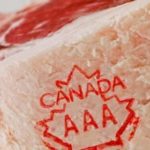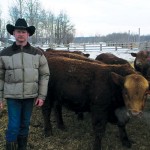The U.S. government’s defense of its country-of-origin labelling (COOL) rule still shows “blatant protectionism and intransigence” according to Canadian officials at what’s expected to be the law’s last appearance before the World Trade Organization (WTO). U.S., Canadian and Mexican officials appeared Tuesday in Geneva before the WTO Appellate Body, where the U.S. hopes to overturn […] Read more

U.S. ‘intransigence’ continues in WTO COOL hearing: officials

U.S. defense of COOL goes to WTO in February
The U.S. government will have its day at the World Trade Organization next month, as its defense of its mandatory country-of-origin labelling (COOL) laws for retail meat is now booked for an oral hearing. The WTO’s Appellate Body division has scheduled its hearing of the U.S. government’s appeal for Feb. 16 and 17 at WTO […] Read more

U.S. to appeal latest WTO loss on COOL
Canada will have to wait up to three more months before it can impose retaliatory tariffs on U.S. goods over Washington’s mandatory country-of-origin labelling (COOL) law on meat from imported livestock. The U.S. government on Friday filed a notice of appeal against the latest ruling by a World Trade Organization (WTO) compliance panel, which last […] Read more

COOL as is can’t be patched to satisfy WTO, Vilsack says
U.S. federal officials don’t see a way their mandatory country-of-origin labelling (COOL) legislation can do what it was designed to do and satisfy global trade rules at the same time. U.S. Agriculture Secretary Tom Vilsack, speaking Monday on a U.S. Department of Agriculture podcast, said officials “do not think that there is a regulatory fix” for […] Read more

U.S. official urges deal on COOL clash
Washington | Reuters — A negotiated solution is the best way to resolve a trade dispute with Canada and Mexico over meat labeling in the short term, a U.S. official said Monday. A World Trade Organization compliance panel said earlier the U.S. has not done enough to change its country-of-origin labeling (COOL) rules after losing […] Read more

Revised U.S. COOL law still breaks trade rules, WTO panel finds
A World Trade Organization compliance panel has ruled the U.S. government offside in its latest attempt at a trade-compliant country-of-origin labelling (COOL) law on meat. Following a long-awaited public release Monday, the ruling may give Canada and Mexico the ammunition to demand COOL be scrapped, on pain of retaliatory tariffs against a range of U.S.-made […] Read more

Meat business undergoing big changes, says agency head
CEO of Alberta Livestock and Meat Agency says ‘pull’ from the marketplace creates opportunities and challenges
Reading Time: 2 minutes The agency he heads is just five years old, but the meat business has changed so radically in that time that a whole new approach is needed, says the CEO of the Alberta Livestock and Meat Agency. “We’ve gone from an area or a time where we’ve had so much supply and we push it […] Read more
Three questions from Alberta cattle producers: Question #1
What’s the fallout from COOL?
Reading Time: 2 minutes EDITOR’S NOTE: We asked a sampling of producers what was on their mind as they were headed into the growing season, and then reporters Alexis Kienlen and Jennifer Blair went looking for answers. COOLing prices Lethbridge-area stockman Andrew Goodrich asks, “Given the strong cattle prices and ongoing exports to the United States, is country-of-origin labelling […] Read more

Tight supplies and rising prices give cattle producers a reason to smile
Low herd numbers are expected to buoy cattle prices for three to four years, but COOL is taking a bite from the bottom line
Reading Time: 2 minutes Cattle prices are the best they’ve been on a per-head basis in the last 10 years — although how good depends on how you look at it. “The market right now is fantastic,” said Herb Lock of Farm$ense Marketing. “Cow-calf producers right now are in their second world, floating around in the sky compared to […] Read more
Slaughter volumes down as Canadian herd numbers dwindle
Modernizing of regulations governing grade standards will take at least two years
Reading Time: 2 minutes As predicted, fed slaughter graded volume decreased in 2013. But what is interesting is the non-fed graded volume increased (non-fed being mostly cows) to compensate for the fed slaughter decrease. This increase of non-fed slaughter does not bode well for the future as it means there are going to be fewer breeding cows in the […] Read more

